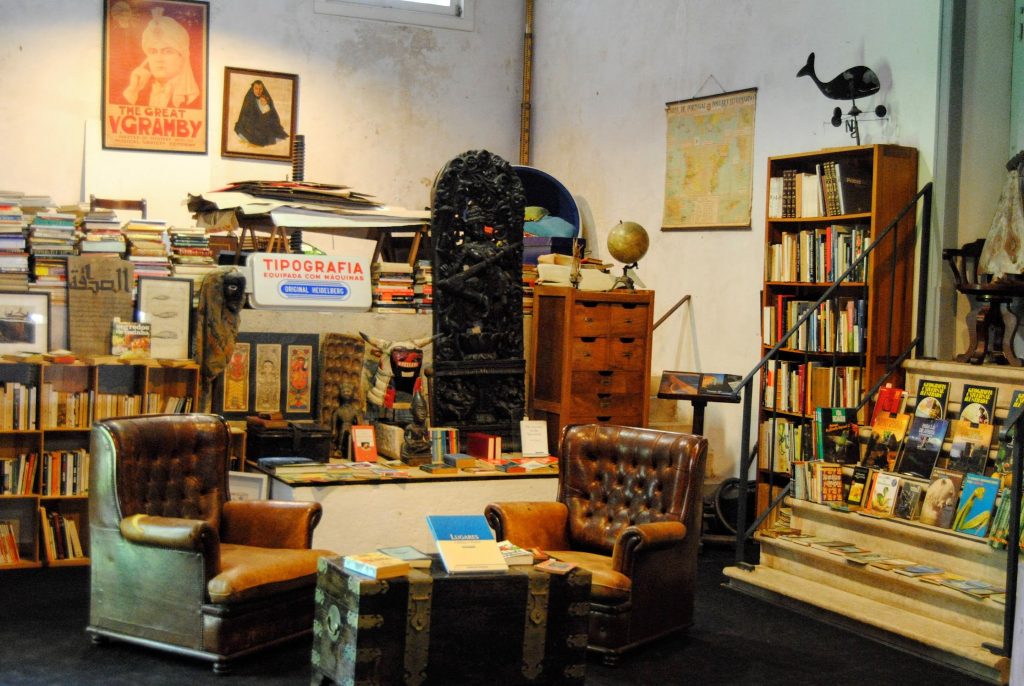By: Sydney Sampson
Photos By: Sydney Sampson
A small village, heralded for its bookstores and surrounded by mediaeval walls sounds like the setting for a high fantasy novel. But right in the centre of Portugal, you’ll find exactly that when you visit Óbidos.
As part of an initiative to revive abandoned buildings, the city launched the Literary City project. Within 5 years, 11 new book shops opened in ‘strange’ locations – old churches, firehouses, and wine cellars are now a bookworm’s paradise. Not only has this allowed the town to restore its historic buildings, but it’s also created jobs and opportunities for authors, boosted the economy, and encouraged reading. UNESCO officially dubbed Óbidos as ‘The City of Literature’ a few years later.
So much of the city centre is book-themed – there are book shops, book hotels, and even book restaurants with cocktails named after famous authors.
Whimsical Bookstores
The first step of the Literary City project was transforming a 12th-century church into a bookstore. Built inside the castle walls, the Livraria de São Tiago is a beautiful mix of past and present. Like any classic bookshop, there are a few cosy reading nooks hidden between the shelves.
If you wander up the winding staircase, you’ll find Natalie Santos, the Poet of Óbidos. For the past 8 years, she’s been using the bookshop’s top floor as her workshop – crafting lace, jewellery, and poetry.
The next stop on this book tour is the Óbidos Biological Market. Once a firehouse, it’s now part bookshop and part organic market. You’ll find books, spices, teas, and locally sourced produce on sale right next to each other, displayed in old fruit crates.
Just outside the Óbidos city gate, you can find the Livraria Artes e Letras. Here, they specialise in used, antique, and collectible books. In an homage to the wine cellar that once stood here, the bookshop now has a wine bar where you can relax with your new book.
When you visit Óbidos, don’t forget to pack a book for the Silver Coast Volunteers Book Exchange. Their small 3-room book exchange has thousands of titles in six different languages. Entirely volunteer-run, this organisation is extremely active in the community – in addition to the book swap, they run a soup kitchen, a clothing drive, and give money to local animal shelters.
And, of course, what better way to end a book-themed day than by staying in a book-themed hotel? The Literary Man was once a convent and is now the largest book hotel in the world. The second you enter the lobby, you’re enveloped by the smell of old books. 40,000 books cover nearly every surface, making the entire hotel one giant reading room.
The hotel’s restaurant sticks to the theme – the walls are covered with floor-to-ceiling bookshelves, and every menu item is named after a famous author or work of literature.
Low Season Festivals
Aside from the bookstores and the mediaeval charm, Óbidos is known for its festivals! There’s almost always a party happening in Óbidos.
In December and January, the city is buzzing with the Christmas Village. Goodbye mediaeval village, hello Christmas village, complete with Santa’s workshop, elves, a spinning Christmas tree, and reindeer. Not only is there a traditional European Christmas market, but also an ice skating rink, carousel, theatrical performances, and a Christmas train running through town. Best of all, an ice mountain with inner tube rides!
But out of all of Óbidos’ festivals, it’s the International Chocolate Festival that I look forward to the most. The festival hosts competitions with categories like Best Chocolate Menu, Best Chocolate Cocktail, and Best Homemade Chocolate Cake. They have chocolate sculptures and chocolate cooking demonstrations. And of course, lots of chocolate tastings.
Speaking of which, Ginja de Óbidos is a traditional Portuguese liqueur, made by infusing sour cherries in alcohol. It originated in Óbidos, and most of the restaurants here offer it, often in a chocolate shot glass.
While not in the off-season, the International Literary Festival of Óbidos (FOLIO) invites Portuguese and international authors to lead lectures, presentations, meet and greets, and workshops. Events are held in bookstores, museums, and galleries across town.
Top Tips for Visiting Óbidos
- Though a train running between Lisbon and Óbidos technically exists, it’s poorly connected and takes nearly 3 hours. Instead, I highly recommend taking the bus that departs from Lisbon’s Campo Grande station. This takes exactly one hour and departs several times throughout the day.
- The paint that covers the houses in Óbidos feels like chalk and smears easily. People tend to draw or write messages on the walls. Please don’t do this – the city is starting to crack down on this and has imposed fines. Plus, it’s rude.
- The city centre is entirely enclosed in mediaeval walls, which are free and open to the public to explore. But be warned – the 13-metre tall walls are narrow and uneven, with no guard railing. As I climbed the southern tower, I was suddenly reminded of my fear of heights. But if you can get past this fear, the views are unparalleled.
- The city castle dates back to 1148. Though most of it was destroyed in the same earthquake that destroyed Lisbon in 1755, it has since been converted into a luxury hotel.
- Óbidos is a village best enjoyed when wandering aimlessly. Go with a vague itinerary, but make sure to leave plenty of time for little strolls down the cobbled streets.





